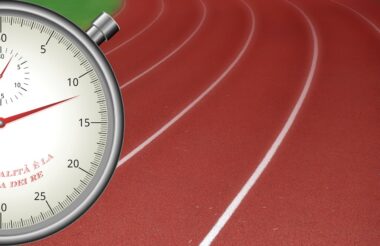Running Gear Essentials for Marathon Training
Preparing for a marathon requires not only physical endurance but also the right gear. First and foremost, selecting the appropriate running shoes is imperative. A good running shoe should provide adequate cushioning, support, and fit your foot perfectly. Many runners benefit from visiting specialized stores for gait analysis, which can help identify pronation types. With the plethora of options available, choosing the right pair can greatly affect your training and performance. Do not hesitate to try several brands and models until you find the ideal match. Additionally, consider utilizing orthotic inserts for added support. Prioritizing shoe quality can enhance comfort and prevent injuries during your marathon training. Furthermore, remember that your shoes have a lifespan, typically around 300 to 500 miles, so keep track of mileage to ensure optimal performance. Moreover, when selecting shoes, consider the weather conditions during the marathon. While lighter shoes may be preferable for dry conditions, a durable and waterproof design would suit rainy marathon days. Overall, investing in a suitable pair of running shoes is key to your training success.
Running Apparel for Comfort
The right apparel plays a significant role in your marathon training performance and comfort. Lightweight, moisture-wicking materials are favored by marathon runners. These fabrics help to keep you dry and comfortable by transporting sweat away from your skin, preventing chafing and overheating. Look for shirts, shorts, and tights that provide a snug but not constrictive fit. Seamless designs or flat seams can also help reduce friction. Additionally, layering your outfits allows you to adjust to various weather conditions. For colder days, thermal layers can offer warmth without bulk, while breathable fabrics should suit warmer climates. Don’t overlook the importance of wearing a good sports bra, regardless of your gender, as it provides vital support and minimizes discomfort. Pay attention to the composition of your clothing as well; synthetic materials can outperform cotton in terms of moisture management and durability. As for socks, selecting high-quality running socks that are cushioned and moisture-wicking can prevent blisters and enhance comfort during long runs. Overall, investing in running apparel tailored to your needs can significantly enhance your marathon training experience.
Essential accessories can significantly enhance your marathon training. One accessory that is often overlooked is a quality running watch or fitness tracker. These devices not only help monitor your time and distance but also provide data on your heart rate and pace. This information is invaluable for assessing your training, adjusting your efforts, and maximizing your performance, particularly as you approach race day. Many advanced models offer GPS capabilities, allowing you to track your routes accurately. For those training in warmer climates, a good hydration system is crucial. Consider utilizing a handheld bottle, hydration belt, or a vest that allows you to carry water with you. Staying properly hydrated during training sessions can prevent fatigue and enhance overall performance. If you frequently train in low-light conditions, a headlamp or reflective gear can be lifesavers. These items make you visible to others, maintaining safety during early morning or late evening runs. Lastly, don’t forget a good running hat or sunglasses to protect yourself from sun exposure. Each of these accessories contributes to a safer and more enjoyable marathon training experience.
Nutrition for Endurance
Another vital aspect of marathon training is nutrition. Eating a balanced diet that fuels your body is essential for your performance. Focus on complex carbohydrates, healthy fats, and lean proteins while incorporating plenty of fruits and vegetables. Carbohydrates should be your primary source of energy, especially in the days leading up to a long run or race. It’s essential to fuel your body adequately before, during, and after your runs. Always carry energy gels or chews during long training sessions; these can provide quick energy boosts when you need them most. Staying hydrated is equally important, so ensure you drink ample amounts of water throughout the day. Electrolyte drinks can also be beneficial during long runs to replenish salts lost through sweat. After each run, prioritize recovery nutrition; protein-rich meals will aid muscle repair. Consider consulting with a sports nutritionist for personalized advice tailored to your unique needs. Overall, adjusting nutrition according to your training plan plays a crucial role in enhancing performance and ensuring a successful marathon training journey.
In addition to the essential gear and nutrition, creating a well-structured training plan is equally important. Adequate planning allows for gradual progression, reducing the risk of injuries while maximizing training benefits. Begin with a proper baseline assessment to determine your current fitness levels. From this point, you can set realistic goals that encompass distance, speed, and overall endurance. Incorporating a variety of runs into your schedule—such as long runs, interval training, and tempo runs—will contribute to building a multifaceted fitness level. Always be mindful of rest days; proper recovery is crucial for long-term success. Listening to your body is essential; if you experience pain or fatigue, adjust your training accordingly. Plan your long runs on weekends when you can dedicate more time and focus. Additionally, joining a running club or finding training partners can provide motivation and accountability. Sharing experiences with fellow runners can also inspire you through challenges. Remember to celebrate milestones, no matter how small. This positive reinforcement keeps you engaged and motivated throughout your marathon preparation journey.
Injury Prevention Strategies
Injury prevention is a critical facet of marathon training that must not be overlooked. Adopting proper running techniques can dramatically decrease the likelihood of injuries during your training. Start by focusing on a proper warm-up routine to prepare your body for the increased intensity ahead. Dynamic stretching can be particularly beneficial in this regard. Following your runs, aim for a cool-down period with static stretching to relax your muscles and improve flexibility. Additionally, foam rolling is a great technique to aid muscle recovery and reduce soreness. Prioritize strengthening your core and stabilizing muscle groups through targeted exercises. Strong core muscles not only improve running technique but also help to maintain posture during long distances. If you begin to feel any discomfort, don’t hesitate to adjust your training or seek professional advice. Cross-training activities, such as swimming or cycling, can provide variety while reducing impact stress on your joints. Staying attentive to your body plays a critical role in prolonging your running career and achieving your marathon goals.
Finally, participants should remember the importance of mental preparation in their marathon journey. The mind plays a pivotal role in endurance sports, which can be just as challenging as the physical aspects. Visualization techniques can be incredibly effective; envisioning yourself completing your marathon successfully can bolster confidence and prepare you psychologically. Incorporating mindfulness or meditation practices into your routine can promote a positive mindset, reducing anxiety before significant runs and the actual marathon. Setting incremental goals can keep you motivated throughout the process; celebrate each accomplishment as a stepping stone toward the ultimate goal. Moreover, learning to embrace discomfort and pushing through challenging moments mentally prepares you for the marathon. On race day, remember that mental fortitude can make all the difference in your performance. If you’re faced with hurdles during the race, having a mental strategy to cope with pain and fatigue will help you push through. Overall, balancing physical and mental training is essential for a successful marathon experience, enabling you to achieve optimal performance and personal satisfaction.
In conclusion, adequately preparing for a marathon involves several components, with running gear being an essential factor. Prioritizing a reliable pair of running shoes tailored to your foot type is paramount for injury prevention and performance enhancement. Just as vital is the selection of running apparel, which should be comfortable and moisture-wicking to support training in various climates. Investing in accessories such as a running watch and hydration system further elevates your training regimen by enhancing performance data tracking and fluid intake. Nutrition plays an equally critical role; fueling with appropriate carbohydrates, proteins, and hydration strategies empowers your body for endurance training sessions. Develop a structured training plan incorporating various run types while being attentive to rest and recovery. Prioritize injury prevention through proper techniques, warm-up, and cross-training activities. Finally, mental preparation is essential; honing your mindset contributes equally to physical success in a marathon. With proper gear, nutrition, training strategies, and mental toughness, you can pave your path to a successful marathon experience.





